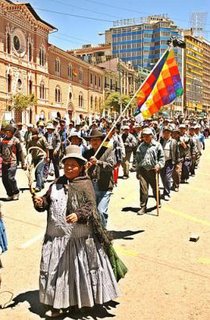
This weekend, two issues overwhelmed Latin American news services. On the one hand, the public relations blitzkrieg launched from La Paz, Bolivia, by former coca-growers’ leader and new President Evo Morales. Hurricane Evo visited four continents in the short period between his election and his inauguration. In some cases, he brought relief, as in Brazil, as Morales seems to have changed his mind about expropriating several oil refineries of Brazilian capital, and in some others, as in Mexico, heightened concerns about the future of Bolivia and its role in the Latin American relations, as Morales hinted the possibility of limiting the exports of gas to Mexico.
On the other hand, in Chile it was all about good news. Michelle Bachelet not only confirmed her success in the presidential election, as hinted in the first round of the elections, but she was able to increase the margin of support for the Concertación, expanding the base of social support for the coalition that Christian-Democrats and Socialists have maintained in Chile for almost 20 years now.
Both electoral stories provide interesting hints about the possible future of the rest of the region. On the one hand, Morales faces challenges that seem to overwhelm him. Not only he already is backing away (for good) from offers made during his presidential campaign, but he has decided to ignite other conflicts in the region with a rhetoric that seems carbon copied from, and in some cases more radical, than Hugo Chávez’s. The difference is that Venezuela never actually confronted a major process of structural reform, while Bolivia confronted the exact opposite situation.
It should not come as a surprise that in one interview with Argentine newspaper Página 12, Morales expressed nothing but rejection for the policies sponsored by the International Monetary Fund. It is important to stress, however, that the tragedy of Bolivia during the 1990s was co-written by the IMF and local politicians as Gonzalo Sánchez de Lozada. Moreover, it is necessary to stress—once again—that in the 1980s and 1990s the IMF sponsored many different policies in Latin America and elsewhere.
The radical policies pursued by Sánchez de Lozada may appear as similar to those sponsored by the Concertación in Chile or by Carlos Menem in Argentina or by Carlos Salinas in Mexico, but there were key differences that is necessary to keep in mind for a meaningful analysis of contemporary Latin America. For starters, neither Mexico nor Chile denationalized key industries such as the oil or copper, while in Argentina and Bolivia
 , the political elites carried away what in the 1990s were called “Garage sales” of pretty much all within their reach, so to assume that it was only the IMF’s fault is, to say the least, absurd.
, the political elites carried away what in the 1990s were called “Garage sales” of pretty much all within their reach, so to assume that it was only the IMF’s fault is, to say the least, absurd.Moreover, in Morales's interview with Página 12, Bolivia's new president emphasizes how there are not going to be anymore "imported models," just to talk immediately about the micro-credits program that he will launch. And of course, any person that has read a little bit the programs of micro-lending sponsored by the World Bank, the sister institution of the International Monetary Fund, cannot but smile at Morales's naïve attitude, because even on that policy, he will be following a program brought from outside, revealing once again the pattern of lies that constitute the backbone of the recent wave of Latin American populists. Read here, by the way, a critique authored by Aminur Rahman of such microlending programs in Bangladesh, following a rationale developed by Indian economist Amartya Sen.
Sadly enough, the excesses of liberal (conservative in the U.S.) president Sánchez de Lozada, combined with the structural failure of Latin American presidentialism (and particularly with the Bolivian version of it) had created all the necessary conditions for the emergence of these kinds of nationalist and nativist approaches emobodied by Morales. These nativist approaches assume that only what has been thought in Latin America or more specifically in their own countries is good to deal with delicate issues. Such approach seems out of line, because as rich as the Aymara tradition is it would be ludicrous to assume that a mere return to such roots will guarantee the solution of Bolivia's problems.
Morales will help himself by turning his head to Lima, the capital of Peru, to see the troubled presidency of the other Aymara president in contemporary Latin America, Alejandro Toledo, who assumed the presidency of Peru under similar circumstances to find himself, 4 years, later pretty much unable to do anything with a political leadership that appears exhausted and confronting a disillusioned public opinion.
Here it is important to stress how in Bolivia all the market-centered fallacies of the liberalism (or conservatism in the United States) were applied. The all-encompassing privatization carried by President Sánchez de Lozada left thousands of persons without access to water and other public goods and services, triggering a popular movement to resist any form of market-inspired solution to the issues affecting the Andean country. It should not come as a surprise that the privatization launched in Bolivia has now, as one of its unexpected consequences, the emergence of Morales's charismatic leadership, with all its contradictions and risks not only for Bolivia itself but also for the entire region.
Interestingly enough, on the other side of the Andes, in Chile, Michelle Bachelet—the first female to be president in Chile—appeared with a fresh and conciliatory message in her discourse, and more important without any pretension to have all the answers in the backpack of Chilean or Latin American “culture.”
Quite the opposite, President Bachelet appears willing to embrace more intensely than ever the Chilean vocation to open markets with a very active and very responsible public sector willing to intervene whenever such interventions seems necessary, while acknowledging the role that markets should play in allocating scarce resources.
This is more relevant when one takes into consideration key aspects of her biography. She and her family suffered the excesses of César Augusto Pinochet’s brutal dictatorship. Bachelet’s presidency will be more important because she is the only true socialist in a continent where many populist leaders, as Hugo Chávez or Ernesto Kirchner, disguise themselves as leftists, whithout having gone through the painful experience that represented for the Chilean Socialist Party acknowledging its own mistakes in pursuing its policy goals without paying attention to the delicate mechanisms of the market.
Technorati Tags: América Latina, Latin America, Evo Morales, Michelle Bachelet, Alejandro Toledo, Carlos Salinas, Bolivia, Chile, Hugo Chávez, microlending, Rodolfo Soriano, Social Change in Latin America

1 comment:
My spouse and I stumbled over here coming from a different website and thought I may as well check things out.
I like what I see so now i am following you. Look forward to exploring
your web page yet again.
my blog post; acheter des followers
Also see my web page :: acheter retweet
Post a Comment